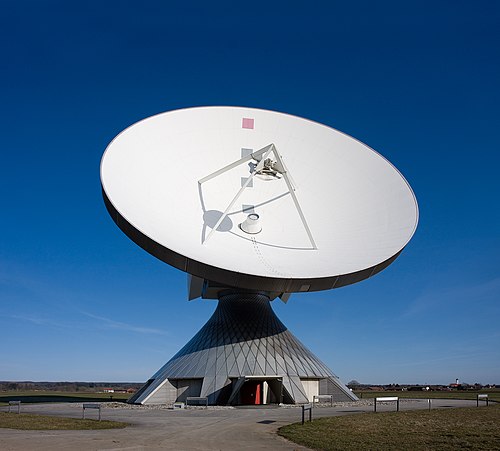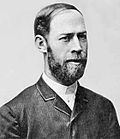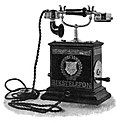Portal:Telecommunication
The Telecommunication Portal

Telecommunication, often used in its plural form or abbreviated as telecom, is the transmission of information over a distance using electrical or electronic means, typically through cables, radio waves, or other communication technologies. These means of transmission may be divided into communication channels for multiplexing, allowing for a single medium to transmit several concurrent communication sessions. Long-distance technologies invented during the 20th and 21st centuries generally use electric power, and include the electrical telegraph, telephone, television, and radio.
Early telecommunication networks used metal wires as the medium for transmitting signals. These networks were used for telegraphy and telephony for many decades. In the first decade of the 20th century, a revolution in wireless communication began with breakthroughs including those made in radio communications by Guglielmo Marconi, who won the 1909 Nobel Prize in Physics. Other early pioneers in electrical and electronic telecommunications include co-inventors of the telegraph Charles Wheatstone and Samuel Morse, numerous inventors and developers of the telephone including Antonio Meucci, Philipp Reis, Elisha Gray and Alexander Graham Bell, inventors of radio Edwin Armstrong and Lee de Forest, as well as inventors of television like Vladimir K. Zworykin, John Logie Baird and Philo Farnsworth.
Since the 1960s, the proliferation of digital technologies has meant that voice communications have gradually been supplemented by data. The physical limitations of metallic media prompted the development of optical fibre. The Internet, a technology independent of any given medium, has provided global access to services for individual users and further reduced location and time limitations on communications. (Full article...)
Selected article -
The Bell Telephone Company was the initial corporate entity from which the Bell System originated to build a continental conglomerate and monopoly in telecommunication services in the United States and Canada.
The company was organized in Boston, Massachusetts, on July 9, 1877, by Alexander Graham Bell's father-in-law Gardiner Greene Hubbard. A common law joint-stock company, the Bell Telephone Company was started on the basis of holding "potentially valuable patents", principally Bell's master telephone patent #174465. Upon inception, Hubbard was installed as trustee, although he was additionally the company's de facto president, since he also controlled his daughter's shares by power of attorney. Thomas Sanders, its principal financial backer, was treasurer. Hubbard also organized the New England Telephone and Telegraph Company, the first local operating company to offer service using Bell's telephone. (Full article...)
General images
Things to do
 |
Here are some tasks awaiting attention:
|
Selected biography -
Samuel Finley Breese Morse (April 27, 1791 – April 2, 1872) was an American inventor and painter. After establishing his reputation as a portrait painter, Morse, in his middle age, contributed to the invention of a single-wire telegraph system based on European telegraphs. He was a co-developer of Morse code in 1837 and helped to develop the commercial use of telegraphy. (Full article...)
Did you know (auto-generated) -

- ... that to comply with broadcasting regulations, some American TV stations claimed that tabloid shows and a Christmas special were educational?
- ... that U.S. regulators determined that a South Carolina radio station broadcast from unauthorized facilities for more than 15 years?
- ... that a Nebraska public radio station operated from a 1916-built Carnegie library in the 1970s and 1980s?
- ... that Windows 3.1 had a special version, known as Modular Windows, that was controlled via television?
- ... that a South Dakota radio station went from a university to "Guns, Gold & Rock 'n' Roll"?
- ... that Rika Nakagawa won a national debate competition as an active tarento?
Related portals
Topics
Subcategories
Associated Wikimedia
The following Wikimedia Foundation sister projects provide more on this subject:
-
Commons
Free media repository -
Wikibooks
Free textbooks and manuals -
Wikidata
Free knowledge base -
Wikinews
Free-content news -
Wikiquote
Collection of quotations -
Wikisource
Free-content library -
Wikiversity
Free learning tools -
Wiktionary
Dictionary and thesaurus
























































































